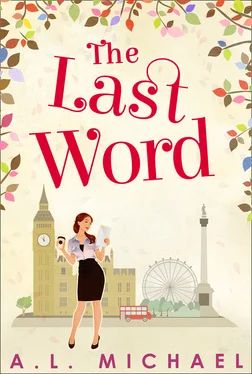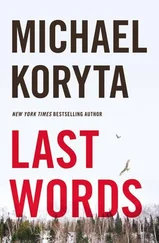Three years later and the shame of it still hadn’t worn off. If she thought about it too much, it made her stomach coil and she had to do something, whether it was the washing up or downing a glass of wine. Sometimes at night she would stare up at her ceiling and wonder if things would have been completely different if she’d never slept with Richard.
She’d been twenty-three, a graduate with the most accolades, the most work-experience, a series of awards to her name. She’d got a job with one of the best newspapers in the country. She had been destined for greatness. Back then, even her mother seemed to be proud of her. Sure, Claudia would make thinly-veiled comments about her weight, how she worked too much, how she’d never get married, but Tabby had actually heard her bragging to her friends about her daughter’s new job. It was the first time she’d made her mum proud.
And then of course, it all went downhill. Richard was older, experienced, powerful. In some ways he had made Tabby feel like a precious child, and in others, she felt suddenly grown-up, real, she was dating a divorcee, an editor at the best paper in the country, after all. Of course, she looked back now, and it was ridiculous. She hadn’t been dating Richard; she had been sleeping with him, and then having work lunches.
She’d been working on an article concerning a political figure and his expenses, as well as his affairs. It was some of the best work she’d ever done, well researched, poignant, disappointed. Richard had been so proud. And then they got word that an injunction was coming in. She was upset, but also just so angry that she’d worked so hard and people in power could just decide that they weren’t a public figure any more and the story had to be shelved.
After a bit of self-pity and a good ranting session, she’d gone in to Richard, shrugged her shoulders and pitched a new story. But Richard didn’t want to give up the story. He had said it was important, she was important. The public had to hear what she had to say. They could weather the storm together, this injunction, it was laughable. They’d make it through, it would be a historical moment for her, and for freedom of speech. He really was full of shit, Tabby thought, and twitched a little at how she’d believed him. He’d convinced her to put it on her personal page of the newspaper website. He had her full backing, he’d be there no matter what: she was a pioneer. Then, of course, she got fired, almost taken to court, he denied any knowledge, kept his job, and went back to his ex-wife. The paper paid a fine, a portion of which she was still paying off, and everyone told her she was lucky she wasn’t charged. Life went on. And all that had been sacrificed to make it all go away was one twenty-three-year-old nobody journalist.
And Harry knew that. Well, he didn’t know about her relationship with Richard, nobody did, except Rhi and Chandra. But he knew that she’d been disgraced, that nobody wanted her. What surprised her was that he could have used that when Crane wanted her to work for free. He could have at least used it to justify less pay, but he hadn’t.
Tabby sat and tried to work out his angle. Was she the story? Disgraced reporter makes comeback? Or could it be the unlikely scenario that Harry was a good person who thought she was a decent writer?
The answer to that question was a resounding ‘no’, Tabby realised on Wednesday night, when she sent off her articles to Harry for his feedback. OK, so she had sent them at midnight, but it was email, she assumed he’d just pick it up in the morning. Instead, straightaway, she received a pointed text: Sending work emails at midnight? Might be time to get a life, love. Harry.
‘Urgh!’ she growled at the screen, throwing a pillow across the room. ‘You told me day or night, arsehole!’
‘What’s up?’ Rhi poked her head tiredly round the door.
‘Sorry, did I wake you?’
‘Nope, studying. You OK?’ Rhi sat down on the bed and started rolling a cigarette.
‘My editor’s an arsehole.’
‘Well, at least you know that from the start this time. And there’s no chance of a Dick the Prick repeat.’ Rhi shrugged, then looked warily at Tabby for confirmation. ‘Right?’
‘Absolutely right, the man is vile. Complete upper-class twat who can’t drink wine that costs less than thirty quid a bottle.’
Rhi made a face, and stuck the cigarette behind her ear. ‘Seriously?’
‘I hate the media,’ Tabby sighed.
‘Sadly, it’s what you’re good at, sweets. You’ve got a gift.’ She kissed Tabby on the cheek. ‘For attracting arseholes, that is.’ She winked and was gone.
‘That include people who choose to live with me?’ Tabby yelled, laughing.
‘Yes!’ Rhi yelled back from her room.
So what if Harry was too busy having fun to read her articles? She didn’t ask him to check his email at midnight. So what if he was out clubbing or drinking, or shagging some girl. That was his problem. Along with the heinous amount of venereal diseases he’d probably accrued. She had a great life, Tabby thought as she looked around her room at the mismatched pillows, papers and books stacked haphazardly and the steadily growing pile of mugs and plates in the corner of the room. It may not be an exciting life, but it was a good one, with good people, who knew how to have fun. And that was the point. Harry could go to hell. She might even send him another email at six in the morning, with the hope that he had a hangover.
Chapter Six
Tabby didn’t wake up early enough to send Harry an irritating email, which was a sincere shame. If she had she may have been able to convince herself that his response to her articles was some sort of payback. As it was, the page-long email he sent the next day was just his opinion. And it hurt.
Obviously, Harry was done mollycoddling her. As much as he’d made more of an effort at the pub, the contents of the email made Tabby think back fondly to the time in the restaurant when he’d called her immature. Immature was looking pretty damn fine compared to ‘Pointless’, ‘Could not care less about the subject’, ‘Are you even trying?’
Well, who did Harry Shulman think he was, anyway? OK, so he was twenty-seven and already a Section Editor, but he clearly had bad taste. Except that he’d picked her. But he obviously didn’t appreciate her.
This was pointless. Tabby flitted back and forth between irrational and rational, hurt and angry, bemused and beyond caring. She tried coming up with new ideas, tried taking his pointed criticisms as constructive, but all she could hear was failure beating loudly in her eardrums. Eventually, at four p.m., after a day of sitting there and being unable to comprehend just how she could become so bad at something she had been so good at in a mere three years she decided to climb into bed and cry.
The next few days were peppered with irritated emails and texts and voicemails from Harry, wanting to know where she was on her rewrites, why she hadn’t responded, and that he hoped she was acting like an adult and knew when to listen to someone who knew better. By Friday morning, after a particularly harrowing voicemail from Harry, wondering if he’d made a mistake in hiring her, she decided to write exactly what she wanted. Which, at that moment, was an article on how to kill your editor. In a ranting rage of typing, huffing and smoking, Tabby completed a ten-step program advising the reader on how to kill your editor and why you’d be justified. It featured one paragraph that asked whether a writer could be pushed so far that torture became not only not a bad thing, but a moral responsibility when faced with an editor who muffled your creative voice. As she finished the last vicious line, attached it to an email and clicked ‘send’, Tabby took a deep breath.
Читать дальше












